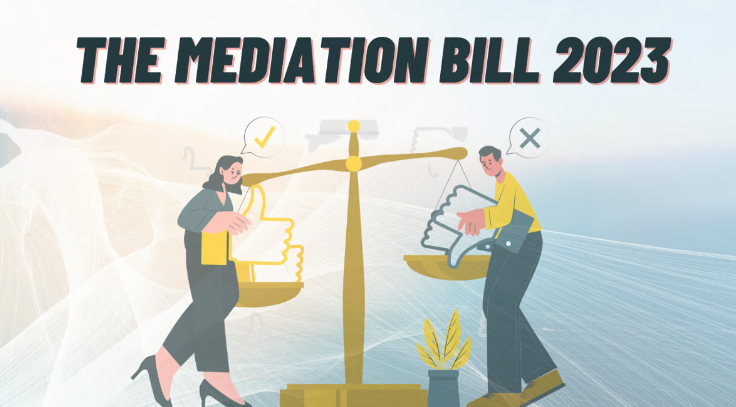Significance of the Mediation Act, 2023, in Transforming Dispute Resolution in India (GS Paper 2, Polity & Governance)

Context
- The Mediation Act, 2023, emerges as a pivotal legislative instrument poised to revolutionize the landscape of dispute resolution in India.
- Championed by Chief Justice of India, Justice D.Y. Chandrachud, this Act signifies a paradigm shift towards mediation as a primary means of resolving conflicts, thereby offering a host of transformative implications:
Formalization and Diversification of Mediation Practices:
- The Act formalizes mediation by providing a structured framework for its implementation across various stages of dispute resolution, including pre-litigation and court-annexed mediation.
- By offering multiple forms of mediation, it caters to the diverse needs and complexities of disputes, thereby enhancing accessibility and inclusivity in the dispute resolution process.
Recognition and Evolution of Mediation:
- Notably, the Act reflects a broader acknowledgment within the legal fraternity, including former Supreme Court judge, Justice S.K. Kaul, of the evolving acceptance and efficacy of mediation as a complementary tool to traditional legal mechanisms.
- This recognition underscores a significant evolution in legal philosophy, as mediation emerges as a mainstream practice endorsed by legal luminaries, thereby fostering a culture of collaboration and mutual understanding in conflict resolution.
Alignment with Gandhian Principles:
- Inspired by Mahatma Gandhi's emphasis on non-violence and reconciliation, mediation embodies a philosophical shift towards peaceful dialogue and amicable settlement of disputes.
- By prioritizing reconciliation over adversarial confrontation, the Act fosters a democratic space for resolving conflicts, echoing India's rich cultural heritage and commitment to non-violent conflict resolution.
Addressing Challenges in Mediator Skill Development:
- While the Act mandates a minimum of 15 years of professional experience for mediators, it also recognizes the need to overcome barriers to entry for aspiring mediators, particularly those transitioning from law school.
- To address this challenge, the Act advocates for innovative training methods and integrated legal education, equipping legal professionals with the requisite skills to navigate both advocacy and mediation roles effectively.
Promotion of Innovative Training Methods:
- In line with the Act's vision, innovative training methods such as co-mediation and shadow mediation are incorporated to provide practical exposure and dynamic learning experiences for emerging mediators.
- These initiatives not only ensure comprehensive skill development but also foster a culture of continuous learning and adaptation within the mediation community.
Way Forward
- In essence, the Mediation Act, 2023, symbolizes a watershed moment in India's journey towards a more inclusive, efficient, and empathetic approach to dispute resolution.
- By formalizing mediation, recognizing its significance, and addressing challenges in mediator skill development, the Act lays a robust foundation for fostering a culture of peace, justice, and reconciliation in Indian society.


